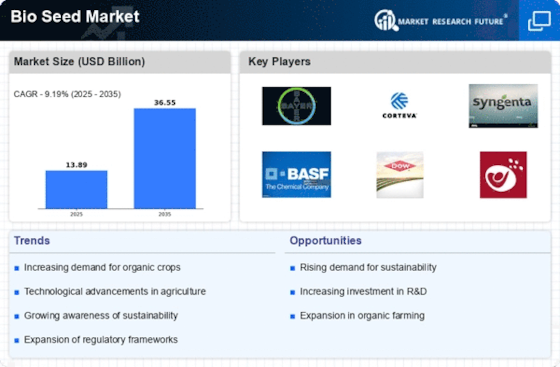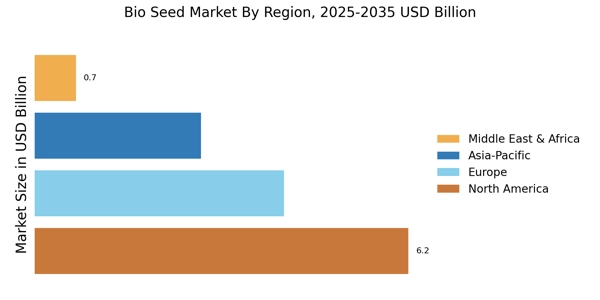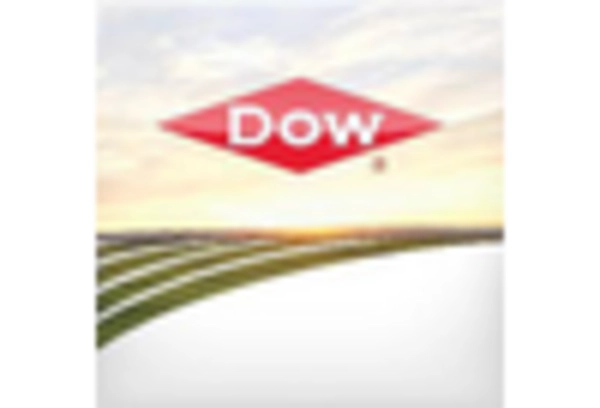Government Support and Subsidies
Government initiatives and subsidies aimed at promoting sustainable agriculture significantly influence the bio seed Market. Many governments are implementing policies that encourage the use of bio seeds through financial incentives and support programs. For instance, subsidies for organic farming practices and bio seed production can lower the financial barriers for farmers, making it more feasible to adopt these seeds. Data indicates that countries with strong government backing for sustainable agriculture witness higher adoption rates of bio seeds. This support not only fosters innovation within the Bio Seed Market but also enhances the overall agricultural landscape by promoting environmentally friendly practices. As such, government involvement is likely to remain a key driver in the growth of the bio seed sector.
Increasing Demand for Organic Produce
The rising consumer preference for organic produce is a pivotal driver in the Bio Seed Market. As health-conscious consumers seek food free from synthetic pesticides and fertilizers, the demand for organic seeds has surged. According to recent data, the organic food market is projected to reach substantial figures, indicating a robust growth trajectory. This trend compels farmers to adopt bio seeds that align with organic farming practices, thereby enhancing the market's potential. The Bio Seed Market is likely to benefit from this shift, as more agricultural producers transition to organic methods to meet consumer expectations. Furthermore, the emphasis on sustainability in agriculture reinforces the need for bio seeds, which are often more resilient and environmentally friendly compared to conventional seeds.
Consumer Trends Favoring Non-GMO Products
The trend towards non-GMO products is a driving force in the Bio Seed Market. As consumers become more informed about the implications of genetically modified organisms, there is a growing demand for non-GMO and organic food options. This shift is reflected in market data, which shows a steady increase in sales of non-GMO products over recent years. Farmers are responding to this demand by seeking bio seeds that are non-GMO, thereby enhancing their marketability. The Bio Seed Market stands to gain from this consumer trend, as it aligns with the values of health-conscious and environmentally aware consumers. As the preference for non-GMO products continues to rise, the demand for bio seeds is expected to follow suit, further driving market expansion.
Technological Innovations in Seed Production
Technological advancements play a crucial role in shaping the Bio Seed Market. Innovations such as genetic engineering, CRISPR technology, and advanced breeding techniques have revolutionized seed production. These technologies enable the development of bio seeds that are not only high-yielding but also resistant to pests and diseases. Recent statistics suggest that the adoption of biotechnology in agriculture could lead to increased crop productivity by up to 30%. This potential for enhanced efficiency and sustainability positions the Bio Seed Market favorably in the agricultural sector. As farmers increasingly rely on technology to improve crop resilience and reduce input costs, the demand for bio seeds is expected to rise, further driving market growth.
Rising Awareness of Environmental Sustainability
The increasing awareness of environmental sustainability among consumers and farmers is a significant driver in the Bio Seed Market. As concerns about climate change and biodiversity loss grow, there is a collective push towards sustainable agricultural practices. Bio seeds, known for their lower environmental impact, are becoming increasingly attractive to farmers seeking to minimize their ecological footprint. Recent surveys indicate that a considerable percentage of farmers are willing to invest in bio seeds to contribute to environmental conservation. This shift in mindset is likely to propel the Bio Seed Market forward, as more stakeholders recognize the importance of sustainable practices in agriculture. The alignment of bio seeds with environmental goals positions them as a viable solution for future agricultural challenges.

















